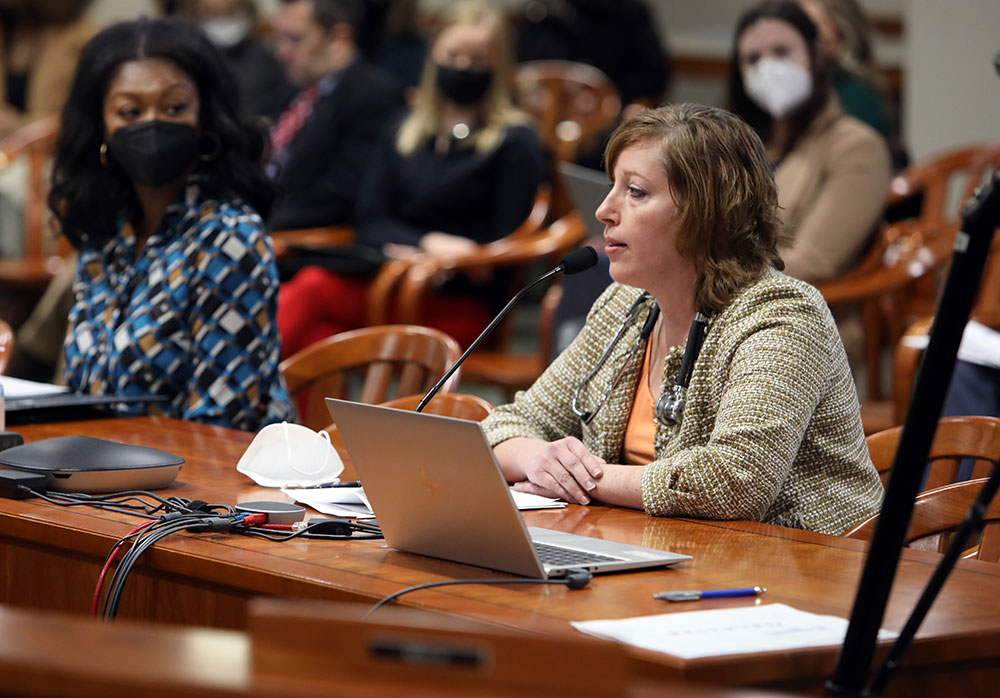LANSING, Mich., Dec. 9, 2021 — Today, the Michigan House of Representatives’ Health Policy Committee held a hearing on a bipartisan package of bills aimed at eliminating and treating lead exposure across the state. State Reps. Rachel Hood (D-Grand Rapids), Sarah Anthony (D-Lansing) and Julie Rogers (D-Kalamazoo) testified in support of the package. The bills combat lead exposure by requiring testing and coverage for Medicaid recipients, providing training for physicians to spot lead exposure, updating codes for renovators, and getting kids the resources they need to overcome the adverse effects of lead exposure.
“Even now, children across the state are dealing with the life-changing consequences of lead exposure,” Hood said. “For a state that has now had two of the worst lead-related tragedies in recent memory, we must do better. Kids and families are falling through the cracks, and we need to better equip our public health system to catch them. We need to test, educate, and support our kids, making sure that every child facing lifelong developmental issues from an entirely preventable risk gets the resources and attention they need to live healthy, happy lives.”
“As a practicing physical therapist, I have rehabilitated many individuals who have had lead exposure and have seen the devastating effects on their nervous systems,” Rogers said. “While I was happy to champion funding for the Lead Poisoning Prevention Fund in our most recent budget, we still have a lot of work to do to eradicate lead in our households and ensure those impacted by lead exposure, especially our children, have access to the care and support they need. I am proud to be part of this bipartisan package to mitigate the impact of, and ultimately end, preventable lead poisoning in our state.”
“Research shows that children with lead poisoning tend to have lower IQs, higher rates of ADHD, worse memory and worse impulse control,” Anthony said. “As adults, they are also at higher risk for chronic health issues such as kidney disease, stroke and hypertension. For every headline about a community going through this crisis, there are many more across the state that have not made the news yet. These health impacts only further perpetuate existing health and economic disparities — we cannot let this stand.”
The bills in the package include:
- HB 5413: Rep. Jim Lilly (R-Park Township) – Replaces the definition of elevated blood lead levels (EBLL) in the Public Health Code with an updated standard.
- HB 5414: Rep. Rachel Hood (D-Grand Rapids) – Requires physicians to take a course to identify and treat lead poisoning in children as part of their continuing education.
- HB 5415: Rep. Pauline Wendzel (R-Watervliet) – Updates the definition of EBLL and various other leaded substances.
- HB 5416: Rep. Angela Witwer (D-Delta Township) – Requires coverage for lead screenings for children, up to age 6, who are on Medicaid or enrolled in MI Child.
- HB 5417: Rep. Sarah Anthony (D-Lansing) – Updates the Public Health Code to reflect updated CDC guidance on the definition of “elevated blood lead levels.”
- HB 5418: Rep. Julie Rogers (D-Kalamazoo) – Requires an automatic referral to Early On for every child with elevated blood lead levels. Families then have the option to enroll and participate in the program designed to deal with and support the consequences of early childhood lead poisoning.
- HB 5419: Rep. Stephanie A. Young (D-Detroit) – Requires a lead paint inspection to be completed on the sale of any home that was built before 1978.
- HB 5420: Rep. Timothy Beson (R-Bangor) – Updates language defining abatement materials and provides for renovator license.
- HB 5421: Rep. Cynthia Neeley (D-Flint) – Makes changes to law required by the EPA to continue authorization for lead abatement and pre-renovation education programs.
- HB 5423: Rep. Julie Calley (R-Portland) – Updates the definition of EBLL and who must be reported to MDHHS under certain circumstances.

